 Petzlover
Petzlover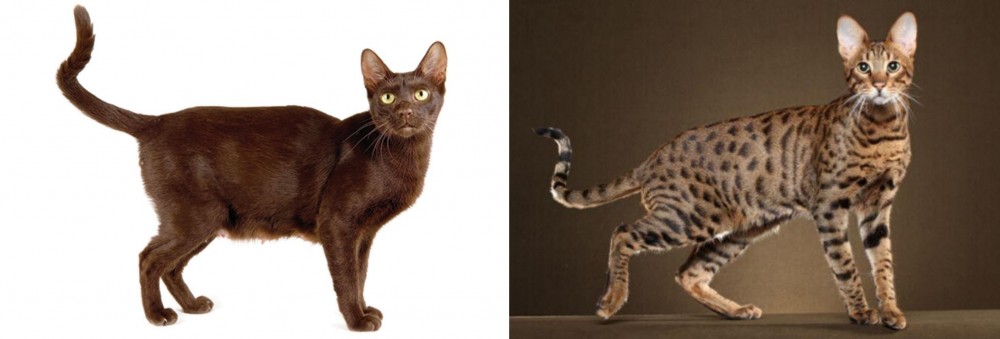 Havana Brown is originated from United Kingdom but Savannah is originated from United States. Both Havana Brown and Savannah are having almost same weight. Havana Brown may live 5 years less than Savannah. Both Havana Brown and Savannah has same litter size. Both Havana Brown and Savannah requires Low Maintenance.
Havana Brown is originated from United Kingdom but Savannah is originated from United States. Both Havana Brown and Savannah are having almost same weight. Havana Brown may live 5 years less than Savannah. Both Havana Brown and Savannah has same litter size. Both Havana Brown and Savannah requires Low Maintenance.
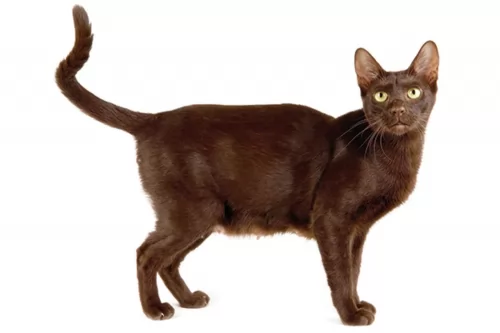 The rare Havana Brown cat seems to be a result of a planned breeding between Siamese and domestic black cats.
The rare Havana Brown cat seems to be a result of a planned breeding between Siamese and domestic black cats.
It was in the 1950s that cat fanciers in the UK became the early breeders. These breeders called themselves the Havana Group. They created the foundation of the modern-day Havana Brown cat.
These breeders managed to produce chocolate shaded kittens which became known as the Chestnut Brown Oriental. Kittens arrived in the US and were crossbred with the Chocolate and Seal Point Siamese to produce chocolate-colored kittens.
In 1964, the Havana Brown was accepted for Championship status by the Cat Fanciers Association.
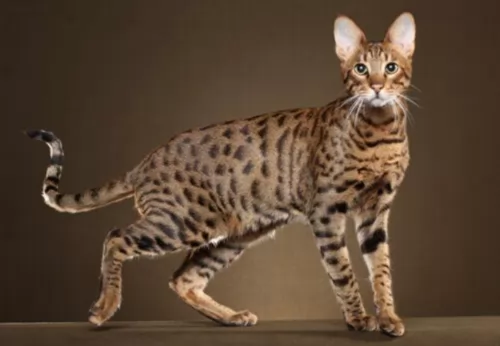 Savannah cats have been bred to look like a Serval but it is essentially a domestic cat. The first Savannah cat was born in the United States in April 1986. The person who was successful in making this happen was Judee Frank.
Savannah cats have been bred to look like a Serval but it is essentially a domestic cat. The first Savannah cat was born in the United States in April 1986. The person who was successful in making this happen was Judee Frank.
She bred a Serval wild cat and a Siamese cat and they produced a female kitten with the name of Savannah – named after the African savannas from where the serval cat comes from.
It will take your Savannah kitten about 3 years to reach his adult size. The Savannah will give birth to up to 6 kittens. The cat was recognized by TICA in 2001.
Today when you’re looking to buy a Savannah kitten, you’ll notice the cats are always described with a filial number, for example, F1, F2, F3, F4, and so on. The filial number describes the generation a cat comes from.
Because this cat belongs to a hybrid group, the feline is banned in a number of states and cities in the United States of America.
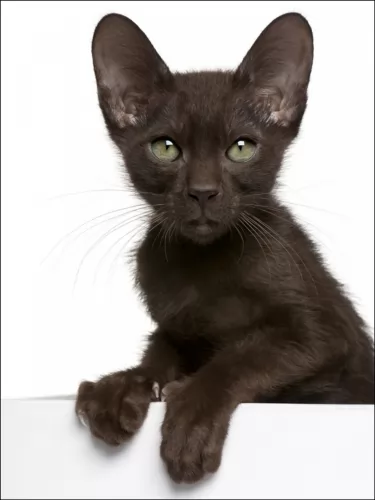 The Havana Brown is a medium-sized cat, being somewhat slender and weighing between 3 and 6kg. The body is long and muscular and the cat has a beautiful brown short to medium-length coat.
The Havana Brown is a medium-sized cat, being somewhat slender and weighing between 3 and 6kg. The body is long and muscular and the cat has a beautiful brown short to medium-length coat.
The coat color is in fact a rich reddish-brown shade. The ears are fairly large and round-shaped and the oval-shaped eyes are a beautiful green.
The Havana Brown is an intelligent, playful, curious cat who enjoys being in the company of its human family. They tend to gravitate towards one favorite family member.
They’re cats that don’t like being left alone for long periods of time. They get on well with children and he also won’t object to becoming friends with the family dog as well.
Friendly though they may be, they also enjoy spending some time on their own. Individual personalities vary but most are playful and talkative.
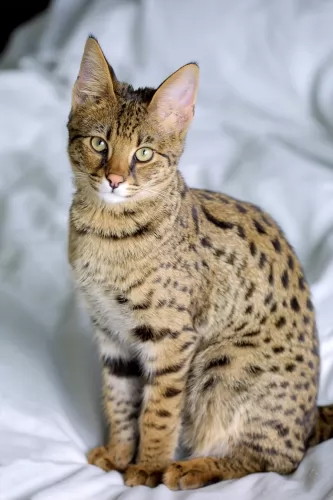 The Savannah Cat is a fairly large cat that weighs anything from 3 to 8 kg. It is a cross between a domestic cat and one of Africa’s smaller wild cats, the Serval.
The Savannah Cat is a fairly large cat that weighs anything from 3 to 8 kg. It is a cross between a domestic cat and one of Africa’s smaller wild cats, the Serval.
Because of the Serval in the mix, the Savannah cat is able to leap into the air too because of his long legs. The cat has a short tail, and similar to the Cheetah has tear markings running from the corner of the eyes down to the whiskers.
A striking feature of this cat is his hooded eyes and the large ears. The Savannah cat has exotic looks and is regarded as a low maintenance cat with its short fur. The coat is tawny-colored with black spots but it comes in 4 background colors – smoke, silver, brown, and black.
An interesting aspect with the Savannah Cat is that they are sometimes compared to dogs. They become loyal pets and companions and will follow their owners around and can even be trained to walk on a leash.
The Savannah is an intelligent cat and can be taught a trick or two. Because the Savannah cat is a hybrid, they aren’t predictable in nature. Some are friendly and social while others are more wild and hostile. Some of them don’t like meeting strangers and will growl and hiss with uncertainty.
They enjoy playing in water and it will be a good idea to invest in a paddling pool for this cat’s outdoor enclosure. It’s an active cat and will require daily exercise. It is better suited to homes where there are older children.
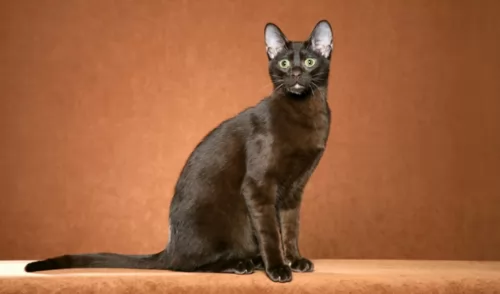 There is a good reason why the Havana Brown cat is so popular. People love the unusually rich brown coat which always has a gleam to it.
There is a good reason why the Havana Brown cat is so popular. People love the unusually rich brown coat which always has a gleam to it.
They also love that this chocolate-colored cat has a wonderful personality and can be a solid companion for humans. So long as you don’t leave him alone for a long time on his own, as that is part of his charm – wanting to be constantly involved with his human family.
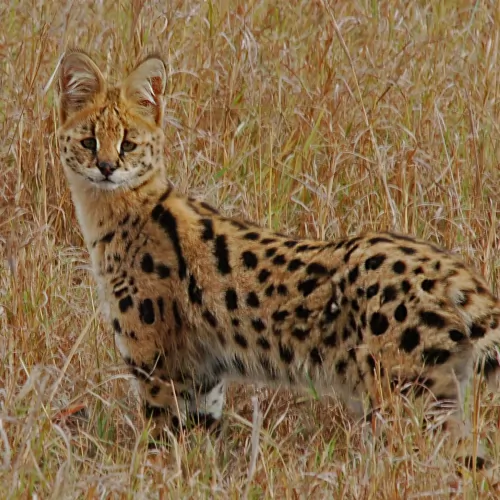 The Savannah cat's temperament is exceptional, and when you’ve got a Savannah in your home, you’ve got a true companion.
The Savannah cat's temperament is exceptional, and when you’ve got a Savannah in your home, you’ve got a true companion.
Cat lovers who have owned one of these cats will tell you that this cat is similar to a dog in many ways. The intelligent cat will follow his owners around and be a friendly, loyal, and devoted companion.
With so much intelligence, beauty, and energy, this cat has all the qualities of a splendid feline companion.
The Savannah will form a particularly strong bond with the human family member who grooms and feeds him.
Everybody who has known the social, affectionate, loyal cat has nothing but good words to say and he may just be the cat companion you want.
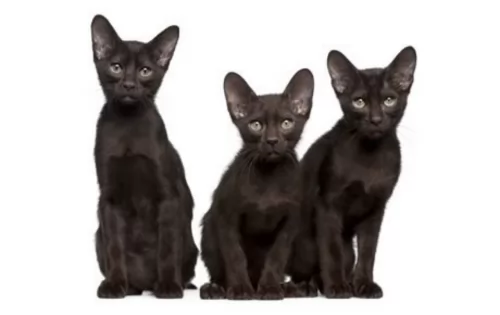 There are no known genetic diseases associated with this breed. They may have a bit of a higher occurrence of gingivitis than other cat breeds, and this thought to come from them having their Siamese ancestry.
There are no known genetic diseases associated with this breed. They may have a bit of a higher occurrence of gingivitis than other cat breeds, and this thought to come from them having their Siamese ancestry.
Beware of bladder stones with your cat which can start at any age. The stones can start off small but can grow larger, rubbing against the bladder walls and resulting in inflammation.
Bladder stones can also lead to blockage of the urethra so that your cat isn’t able to urinate. There are symptoms to indicate your pet may have bladder stones and these can be straining to urinate, painful and little urination, urinary tract infections, and blood in the urine.
This is a time when you want to get your pet to the vet just as soon as possible.
Also, be on the watch for eye infections. Conjunctivitis is one of these to look out for but there are other eye infections your cat can experience. They can come about because of an upper respiratory infection that spreads to the eyes, but they can be caused by any number of things such as bacteria, parasites, and viral infections.
You’ll notice your cat pawing at his eyes and there may even be redness, discharge, and swelling. You vet will be able to treat eye infections with ointments and eye drops.
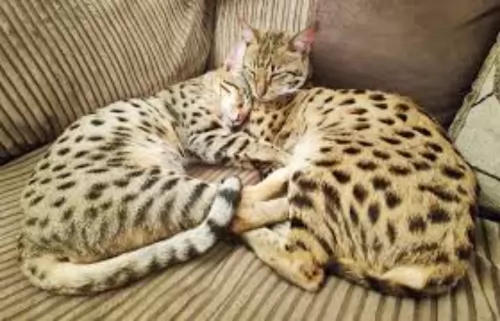 The Savannah is generally a healthy cat. The cat can also fall prey to some of the typical cat illnesses there are -
The Savannah is generally a healthy cat. The cat can also fall prey to some of the typical cat illnesses there are -
Allergies happen with cats when their immune systems become sensitive to certain things. Cat allergies can be environmental, from fleas or from food allergies.
While some allergies may come and go, others will require an examination by the vet as they can include itchy skin problems. Typical allergy symptoms include sneezing and coughing, runny eyes, diarrhea and vomiting.
This is a gastrointestinal disorder. Cats of any age are affected but it is found more in older cats. Chronic inflammation of the gastrointestinal tract can come about because of a food allergy for instance or parasitic or bacterial infection. Your Savannah cat will be vomiting and lethargic and have diarrhea and weight loss.
These are parasites that invade the small intestines of a cat. It can cause anemia and inflammation of the small intestine. Hookworms can produce symptoms such as weight loss, coughing, and diarrhea as well as skin irritations.
This condition causes thickening of the muscular walls of a cat’s heart. The heart’s left ventricle is thickened. The heart can beat rapidly and this results in more oxygen usage. It can also lead to oxygen starvation which causes heart cells to die off. A condition known as arrhythmia develops where the heart beats irregularly.
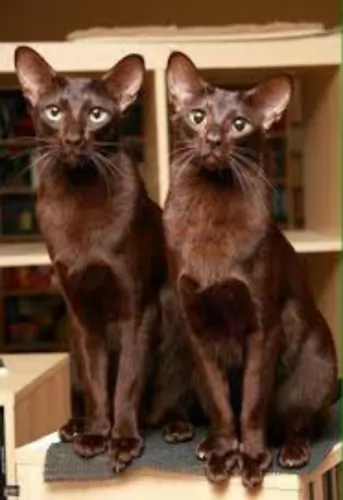 With the cat’s short coat, he experiences little shedding so very little grooming is required. A gentle brush once a week will be enough. These cats love attention and submit easily to a brush and body rub with a soft rubber brush.
With the cat’s short coat, he experiences little shedding so very little grooming is required. A gentle brush once a week will be enough. These cats love attention and submit easily to a brush and body rub with a soft rubber brush.
Check inside the mouth as periodontal disease is a problem with cats. You want to make sure that there aren’t any bad teeth as this can cause a lot of pain.
A vet can also be useful in examining your cat and pinpointing problems.
Check the inside of the ears too because they can become somewhat clogged with wax and dirt. If you don’t want to probe inside the cat’s ears with a cotton ball with warm water and apple cider vinegar, you can take your cat to the vet or to a professional cat groomer.
Keep the litter box of your cat spotlessly clean as these cats are fussy with cleanliness.
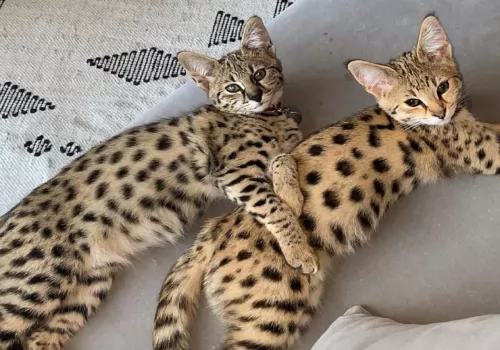 The Savannah cat's diet needs to be a high-quality type of food with efficient levels of protein and taurine. The reason for this is that all cats are carnivores. A properly balanced raw diet will be the best nutritionally balanced food you can provide.
The Savannah cat's diet needs to be a high-quality type of food with efficient levels of protein and taurine. The reason for this is that all cats are carnivores. A properly balanced raw diet will be the best nutritionally balanced food you can provide.
The Savannah has a short coat, which makes him low maintenance. He will still need to be brushed once a week. This will ensure a healthy sheen, and it will remove loose hairs and dust.
Provide for this intelligent cat’s physical and mental stimulation. He will need a variety of interactive toys. You yourself, need to become involved with your feline friend and give him a game too.
Make sure your Savannah is up-to-date with all his vaccinations. If you’re in any doubt about your pet’s health and wellbeing, get him to the vet who can provide you with valuable information on his health and his diet to ensure optimal health for your feline friend.